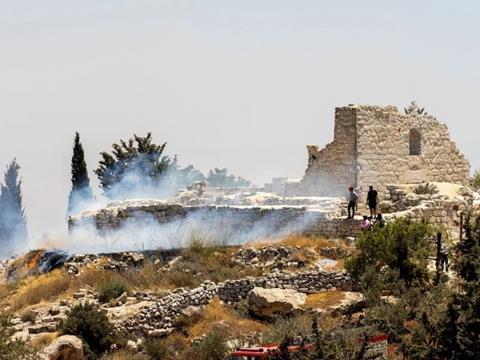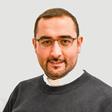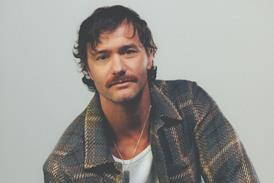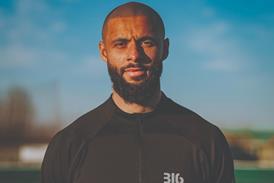Last week, Jewish settlers set fire to the graveyard of an ancient church in Taybeh, the last remaining Christian-majority town in the West Bank. Father Bashar Fawadleh explains what it is like to live under the shadow of constant attacks and restrictions, and asks the Church to pray for peace and justice

Palestinian Christians want to live in peace. But over the past few years, more and more Jewish settlements have occupied land surrounding my city, Taybeh, in the West Bank.
A few weeks ago, construction began on a new settlement in the east of Taybeh. Then they came with 20 cows and grazed them among our olive trees, which destroyed the harvest and damaged the trees.
Last Monday, settlers started a fire in the cemetery behind the ancient church of St George, which has been here since the 5th century.
The church is an archaeological site, and we use it for services, especially the feasts and procession of Palm Sunday. We gather all together - the three churches, Orthodox, Greek, and Roman Catholic – to celebrate Easter, Christmas, the sacrament of baptism and marriage. We celebrate mass there and go there to light a candle and pray for peace and justice in our city.
To be a Palestinian priest is very unique. It is very hard – and yet it is very joyful
We were so shocked that the settlers would attack us and set fire to our holy site. We rushed there to pour water on it and stop it. It is the first time that something like that has happened here. Now, we are so very afraid to go to the east of Taybeh - but that is where the majority of the olive trees are.
The olive trees belong to the people and the families in the town, and also to the church. We make very good extra virgin oil here, which is sold all around the world. Now, we cannot go and harvest - it will be very difficult. Fear lives in the heart of our people, because we are afraid of the armed settlers and what they might do.
Ancient faith
Taybeh is a very unique place because Jesus visited this village. In John 11:54, it says Jesus “withdrew to a region near the wilderness, to a village called Ephraim” - we are Ephraim. We were not converted from another religion to Christianity. We were born Christian - and our great great grandfathers and mothers were born Christian. So, Christians have been here for thousands of years. And we will stay here, despite everything, because we love our land - but we need peace.
It is also special because it is the last town in the West Bank where the population is 100 per cent Christian. But unfortunately, the population is now very low. Because of migration, there are only 1,245 persons left. Palestinian Christians are rooted in this land. We are the living stones, and we don’t want to leave. But a lot of Palestinian Christians are thinking about going to a place with safety, to live where there is no war, to live without any restrictions, checkpoints, any settlers to create problems. Now, more than 14,000 people from Taybeh have joined the disapora. In the US, there are 6,000; in Chile, 1,000; in Guatemala, 2,000 and many in Jordan, too.
Attacks and restrictions
People might be surprised to hear about Jews attacking Christians, but settler attacks happen [not because of religion] but because we are Palestinians.
I’m a Christian priest, and I’m Palestinian. I was born in Jerusalem, and my family are from a small village near Ramallah. I am forbidden to go to Jerusalem without permission. I am forbidden to drive my car without permission. These restrictions are because we are Palestinians, not because we are Christians or Muslims. That’s why we are asking the international community for our rights - the rights to move, to live, to travel, to play, to learn, to go for a picnic, to have some rest, to go to the beach. We don’t have those rights.
Since 7 October, the situation has got a lot worse. When the war began, many people were forbidden from going to Jerusalem to work. In Taybeh, 70 families were forbidden, so unemployment now is very high.
People might be surprised to hear about Jews attacking Christians, but the attacks are because we are Palestinians
The church is doing its best. Since 7 October, we have created 40 jobs, with the support of the Latin patriarchate and other local and international organisations. We have employees in the compound of the parish. We have an online radio station. We have a home for the elderly. We have a school. Now, the Latin patriarchate in Taybeh has more than 120 employees, both Muslim and Christians. We also offer help with medical issues and with school and university fees.
We do as much as we can to give people hope. But it is not enough. People need money. But they also need to live in dignity and peace.
Pain and joy
We would ask the Church to continue praying for us. And also to come and see what it is like here for yourself. When you come and see our houses, stay in our guest rooms, you can tell the truth of what it’s like to live under the occupation, under the restrictions, checkpoints and the attacks of the settlers.
I was born in 1987, the year when the First Intifada began and the Palestinians resisted the Israeli military occupation. I entered seminary in 2000, the start of the Second Intifada, when there was conflict between Palestinians and Israelis again. I was ordained in Ramallah in 2014. On the night of my ordination, the Israeli occupation attacked Ramallah.
To be a Palestinian priest is very unique. It is very hard – and yet it is very joyful. You have to give hope to people under your spiritual guidance. My mission here will always be to bring hope, happiness and joy - because we are Palestinian Christians, and we are awaiting the third day, the triumphant entry when we will have new life.
Bashar Fawadeleh was speaking to Emma Fowle




































2 Readers' comments